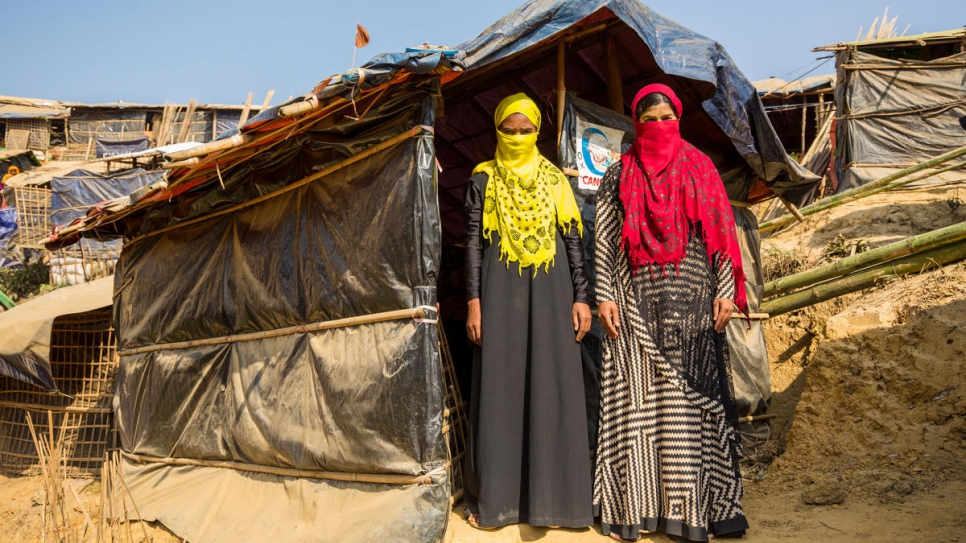Their parents were likely killed in Myanmar, and now 17-year-old Mabia and her three younger sisters must start over in Bangladesh.

Shamshidah, left, and Mabia, far right, walk to their shelter in Kutupalong refugee settlement, accompanied by refugee widow they met at the UNHCR information point
After armed men detained her parents, Mabia heard a volley of gunshots. The 17-year-old took her three younger sisters and ran to the forest. The Rohingya sisters trekked from their home in Myanmar to Kutupalong refugee settlement in South-east Bangladesh in mid-February, where Mabia, now head of the family, feels the weight of caring for her siblings aged 16, 15 and 14.

“I want to feed them well, and most of all, I don’t want them to remember the bad things that they saw in Myanmar,” says Mabia. Besides securing shelter, food, water, cooking utensils and bedding for her sisters, Mabia sees other responsibilities that she must also meet in her new role as their primary carer.
The teenager is among at least 5,600 children in the world’s largest refugee settlement who find themselves the lone heads of families and households, whose parents have been killed or are missing in Myanmar. Many are girls.

Nur, 30, a mother of four young children, reached Bangladesh in September with her family. As one of the 300 UNHCR Community Outreach Member, she now works as volunteer to identify refugees who need support in this huge pop-up settlement and refer them to available services. She found the collapsed young girls that morning, then she took them to an information point run by UNHCR, the UN Refugee Agency, as a first step to getting them the help they need.
A team of five UNHCR staff and its partner Technical Assistance Inc., conduct a case meeting for them and offer upgraded housing, counselling and follow-up visits to ensure they stay safe from sexual abuse. Another worker seeks to match them up with occupational training, such as learning to sew, make toothpowder or soap – should they want it.
After the case meeting, Mabia and Shamshidah are uncertain what to do. They have some security in the borrowed shelter and wonder if they should accept something clearly better, but unknown. Nur is gentle but firm. She tells them that, so far, all the interventions she has made on their behalf have been good for them. Mabia listens and then nods.
Like all Rohingya, they are stateless, with no right to vote, move freely or have access to services in their country of birth. However, the sisters were able to study and want to return to class.
“It was difficult to continue education for me after fourth grade, but I want to be a doctor. If there’s an opportunity to study, I must grab it,” says Shamshidah, animatedly.
Mabia also wants to study: “If I’m properly educated myself, then I can educate others,” she says.
*Refugee sisters’ names changed for protection reasons
About UNHCR:
The Office of the United Nations High Commissioner for Refugees (UNHCR) was established on 14 December 1950 by the United Nations General Assembly. The agency is mandated to lead and coordinate international action to protect refugees and resolve refugee issues. It strives to ensure that everyone has the right to seek asylum and find safe refuge in another state, with the option to voluntarily return home when conditions are conducive for return, integrate locally or resettle to a third country. UNHCR has twice won the Nobel Peace Prize, in 1954 for its ground-breaking work in helping the refugees of Europe, and in 1981 for its worldwide assistance to refugees.
Share on Facebook Share on Twitter